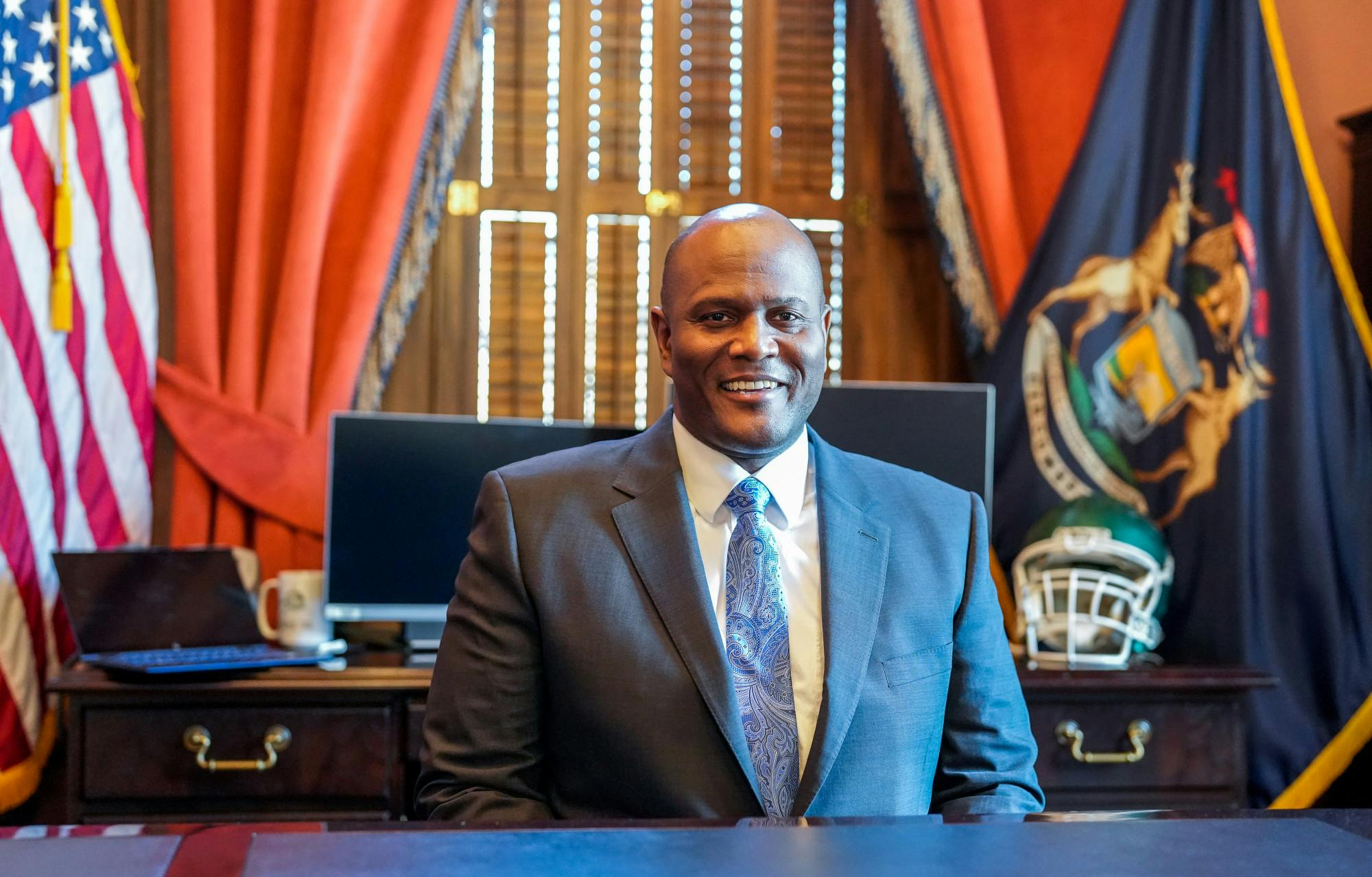Michigan House Speaker Joe Tate, D-Detroit, still remembers running out of the tunnel under the lights at Spartan Stadium in his first game as a student-athlete.
Now, nearly 25 years later, he’s experiencing a different kind of thrill under a spotlight — one that comes with being one of the top-ranking elected officials in the state.
Tate, who was elected to the Michigan House of Representatives for his first term beginning in 2019, hails from the 2nd District, which encompasses part of Detroit and its northern suburbs. Born and raised in Detroit, Tate said his upbringing gave him a strong sense of public service.
“My dad was a firefighter for the City of Detroit, my mom was a public school teacher for Detroit Public Schools for a number of years,” Tate said. “And I think through their actions, they taught me that service is important and giving back to others, giving back to your community, doing your part.”
Tate’s football success brought him from Detroit to Michigan State University in 1999, where he joined the team under Nick Saban and, later, Bobby Williams. He studied public policy and started in 29 games at left guard during his time at MSU, an experience he said shaped the way he approached careers in the military and later in politics.
“Playing football, it's certainly a team sport,” Tate said. “You have eleven people on the field at all times. That's your team, trying to work together towards a goal … and that was similar to the Marine Corps and politics.”
Tate made his mark on and off the field at MSU, earning the university’s award for community service and leadership in 2003 for involvement with the Drug Abuse Resistance Education program and reading to local school children.
Following his graduation from MSU in 2004, Tate spent time in the NFL playing for the Jacksonville Jaguars, Atlanta Falcons and St. Louis Rams. Eventually, he returned to East Lansing for a master’s degree in kinesiology, during which he worked as a graduate assistant in the football program. In 2009, he decided to join the U.S. Marine Corps, where he served two tours in Afghanistan.
After leaving the Marines, Tate returned to his home state, this time to pursue a dual master’s degree at the University of Michigan in 2017. Upon graduation, Tate began his first campaign for the state house, a decision that would lead him to become Michigan’s first-ever Black Speaker of the House in 2023.
Tate said the weight of his position and its historical value isn’t lost on him.
“The reason I'm in this position is because of the work that people have done, and have already kind of laid the groundwork for me to be able to be in this role,” Tate said. “And there is a responsibility to that.”
Tate said positive representation is always at the forefront of his mind during his work, and he’s concerned about Detroit’s lack of Black congress members in 2023.
The election of U.S. Rep. Shri Thanedar, D-Detroit, to Michigan’s 13th Congressional District in November 2022 marked the end of a 70-year streak of Black congressional representation for the city, which has a 77.2% Black population, according to the 2020 Census.
“At the end of the day, representation matters,” Tate said. “This is similarly reflected in our halls of government. To make the best policy decisions, you have to have diversity in those spaces. And you have to have those people that really understand the needs of the community that they serve.”
Tate said he draws inspiration on this topic from his grandparents, who moved to Detroit from the South during the Great Migration.
“We are a state where Black Americans have helped to grow and move this thing forward and have settled here,” Tate said. “So I think being able to have that reflection is incredibly important. And at the end of the day, we need to ensure that those voices are being heard.”
Tate said being a Black man in politics isn’t always easy and comes with its fair share of stressors. After recent police murders of Black men like Tyre Nichols in Memphis, Tenn., Tate said he’s acutely aware of the dangers facing Black people.
“People are exhausted by having to continue to see this take place,” Tate said. “And I most certainly do not want to have another conversation with a parent that lost a son at the hands of police officers.”
Tate said he’s committed to finding ways to prevent police violence and hopes to tackle it in the ongoing legislative session.
As the top house legislator, Tate said he’s centered his priorities around “putting people first”. Democrats now hold a majority in both chambers of the legislature for the first time in nearly 40 years. This puts him in a unique position to lead his caucus toward the realization of decades-old policy goals.
He’s particularly interested in bringing tax relief, civil rights expansions and updates to antiquated laws surrounding abortion to Michiganders.
“We want to get to work,” Tate said. “Democrats want to get to work putting people first.”







